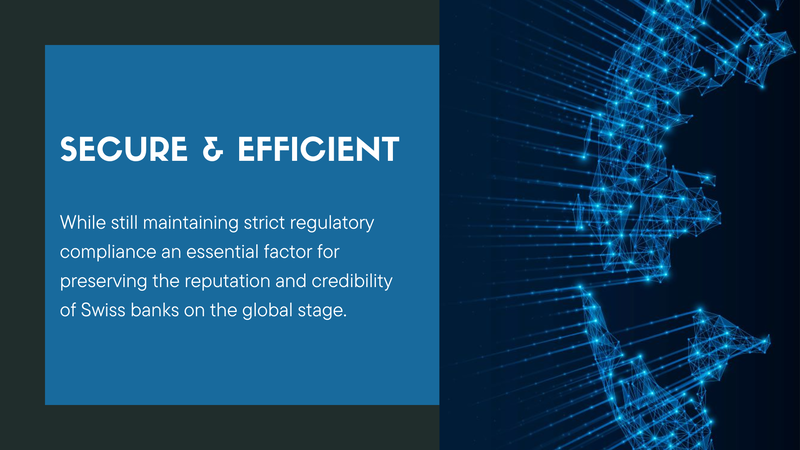Compliance outsourcing solutions for Swiss banks that are secure and efficient
Explore how compliance outsourcing helps Swiss banks enhance efficiency while ensuring regulatory adherence. In the face of an increasingly complex financial system, Swiss banks are under growing pressure from both domestic and international regulatory requirements. To maintain a strong position in the global market while optimizing operational costs, many Swiss banks have adopted compliance outsourcing as a strategic solution. This involves delegating compliance-related functions to external partners instead of managing them internally, ensuring that business operations continue to meet all legal and regulatory obligations.
Compliance outsourcing not only helps reduce costs but also brings greater flexibility and specialized expertise in handling increasingly intricate compliance challenges. In the financial sector particularly for institutions like Swiss banks, outsourcing compliance services enables access to advanced technologies and experienced professionals, capabilities that may not be feasible to develop in-house. This approach allows banks to focus more on their core activities, such as customer service and asset management, while still maintaining strict regulatory compliance an essential factor for preserving the reputation and credibility of Swiss banks on the global stage.

Why do Swiss banks need compliance outsourcing?
In a global financial environment increasingly shaped by strict regulations such as FINMA, GDPR, and Basel III, maintaining banking compliance has become a major and ongoing challenge for financial institutions. Financial regulations are complex, evolving, and essential for ensuring transparency, data protection, and stability. For banks, compliance is no longer just a regulatory obligation but a safeguard for operational integrity and reputation. However, as rules vary across jurisdictions, meeting both local and global standards requires major investments in systems, technology, and skilled staff. Maintaining in house compliance teams adds heavy costs in recruitment, training, and infrastructure. To address these challenges, many banks are turning to compliance outsourcing delegating compliance functions to external providers to cut expenses and streamline operations.
Compliance outsourcing not only offers substantial cost savings but also provides financial institutions with a competitive edge by granting them access to cutting-edge technologies and highly experienced professionals from specialized service providers. These third-party providers offer deep expertise and innovative solutions that allow financial institutions to manage their compliance more effectively. By leveraging compliance outsourcing, banks and other financial organizations can improve their efficiency in navigating complex regulatory landscapes while simultaneously minimizing legal and operational risks. This is especially important given the severe consequences that can arise from non-compliance. In practice, failure to adhere to regulatory requirements can result in significant fines, irreparable reputational damage, and the loss of customer trust—all of which are highly damaging in the financial sector.
Rebuilding after such events can be challenging and costly, making proactive compliance a top priority for any financial institution. For these reasons, compliance outsourcing is rapidly becoming a critical component of many banks’ risk management strategies. By outsourcing compliance functions, financial institutions can focus on their core business activities, such as customer service and product development, while ensuring they remain fully compliant with an ever-changing regulatory environment. This strategy not only mitigates the risk of costly fines and penalties but also enables institutions to stay ahead of the curve in an increasingly complex and competitive global marketplace.
Compliance outsourcing in information technology – A strategic approach
In the context of technology becoming increasingly integrated with the financial sector, Regulatory technology (RegTech) plays a crucial role in ensuring effective compliance. RegTech systems help monitor data, secure information, store records, and generate reports in line with legal requirements, all automatically and accurately. This has led to a new trend in compliance outsourcing, where organizations not only outsource legal services but also hire technology solutions that integrate compliance elements—essentially an IT outsourcing model with a clear compliance orientation.
Today, compliance outsourcing goes beyond just cost savings to include key IT services such as technology risk management, legal-compliant data storage and protection, system access control, and information encryption. Additionally, the ability to audit and monitor systems in real time a key component of Regulatory technology is often implemented through specialized outsourcing partners. By integrating technology into compliance outsourcing, financial organizations can ensure both system security and high levels of compliance in a constantly changing regulatory environment.
Outsourcing in compliance and technology has become an important strategy for financial organizations to enhance operational efficiency. Through partnerships with specialized security service providers, businesses can strengthen system security through continuously updated technologies. At the same time, third-party providers with in-depth knowledge of international laws and local regulations ensure precise and consistent compliance. This model also brings significant cost benefits by minimizing expenses related to operations, salaries, and internal training. In particular, outsourcing accelerates the digital transformation process by shortening the time to deploy new systems while still meeting compliance requirements. Finally, the flexibility and scalability of this model allow businesses to adapt quickly to market changes and growth needs.
Although compliance outsourcing offers many benefits in terms of cost and efficiency, financial institutions also face several challenges when implementing this model. One of the greatest concerns is the potential loss of control over sensitive data when entrusted to a third party. Additionally, assessing the reliability and true capabilities of service providers is a difficult task, especially in fields that require strict compliance standards. Furthermore, contract management and clearly defining legal responsibilities between the parties can pose risks if not carefully established from the outset. To address these challenges, organizations must choose trustworthy partners, build thorough testing and monitoring processes, and establish clear and detailed Service Level Agreements (SLAs) to ensure transparency and accountability throughout the partnership.

Best practices when implementing outsourcing
To implement compliance outsourcing effectively, banks must adopt a strategy that balances efficiency with strong risk control. This involves safeguarding sensitive data, ensuring compliance at all levels, and selecting the right partner with expertise in both Swiss and international regulations. The right partner ensures compliance processes are accurate, timely, and adaptable to regulatory changes. IMT Solutions is an ideal choice, offering specialized expertise and tailored solutions to meet each bank’s compliance needs. From navigating complex regulations to managing tasks across jurisdictions, IMT Solutions helps banks maintain operational integrity. Establishing clear Service Level Agreements (SLAs) with measurable metrics further ensures transparency, accountability, and alignment of expectations.
Key strategies for successful compliance outsourcing
Given the sensitive and high-stakes nature of compliance activities, many banks opt for a hybrid model, which involves keeping key compliance functions such as internal controls within the organization, while outsourcing supporting tasks to external partners. This model not only helps optimize resources but also ensures that banks can focus on their core competencies while outsourcing more specialized tasks. To ensure the ongoing quality and minimize potential risks associated with outsourcing, periodic risk assessments are essential. Regular evaluations, along with maintaining an independent oversight team within the bank, are vital in ensuring the compliance process remains under control, secure, and aligned with regulatory standards throughout the outsourcing partnership.
As Swiss banks face mounting pressure from increasingly complex legal regulations, rising operational costs, and an intense push toward digital transformation, compliance outsourcing is rapidly becoming a strategic solution. When implemented correctly, this model provides significant advantages by helping banks balance operational efficiency, stringent compliance requirements, and high levels of information security. Beyond merely cutting costs, compliance outsourcing empowers financial institutions to concentrate on their core activities, such as enhancing customer experiences and expanding their product offerings, while delegating compliance-related responsibilities to experts. It’s essential to view compliance outsourcing not as a simple cost-reduction tactic, but as an indispensable component of a bank’s long-term digital transformation journey and broader risk management strategy. With IMT Solutions as your trusted partner, selecting the right compliance expertise and establishing a strong governance model will be key to unlocking the full potential of this solution, driving efficiency, compliance, and growth for your financial institution.








